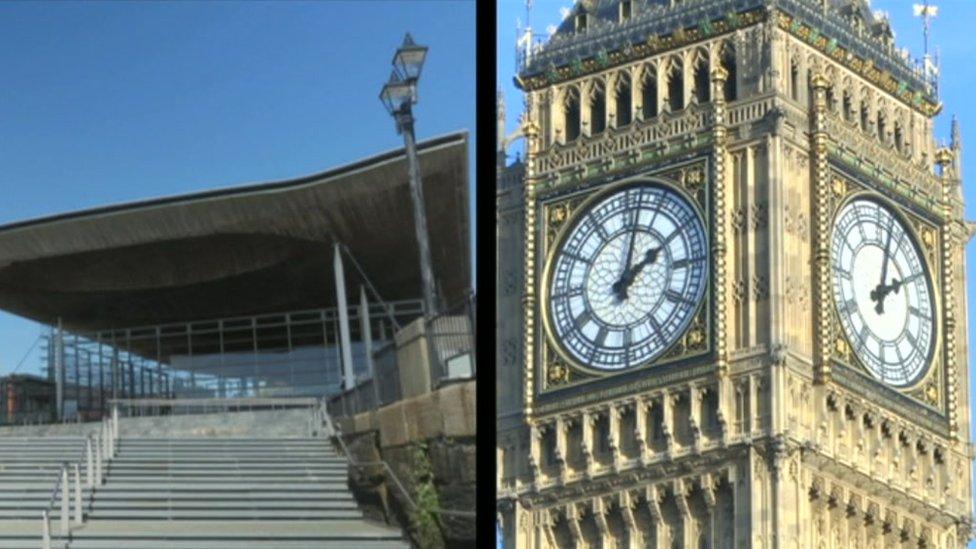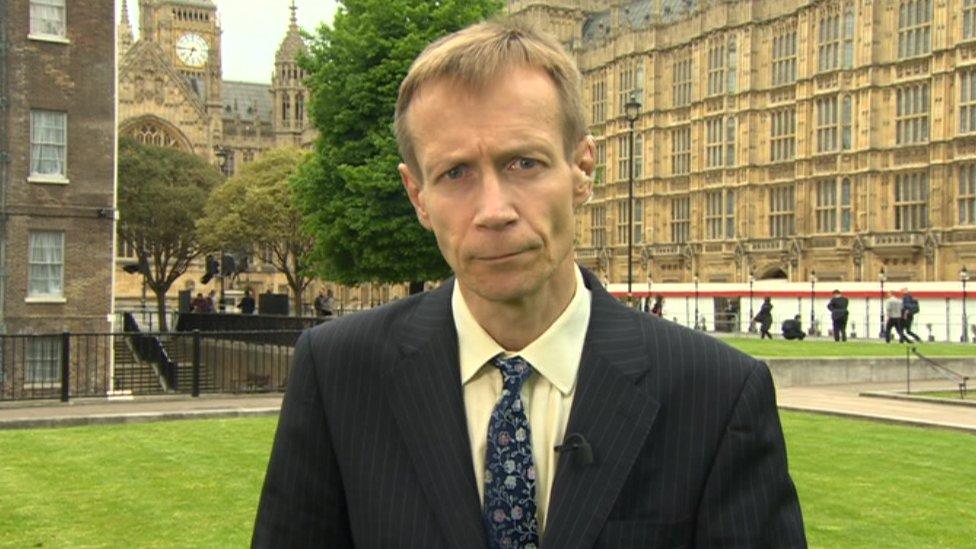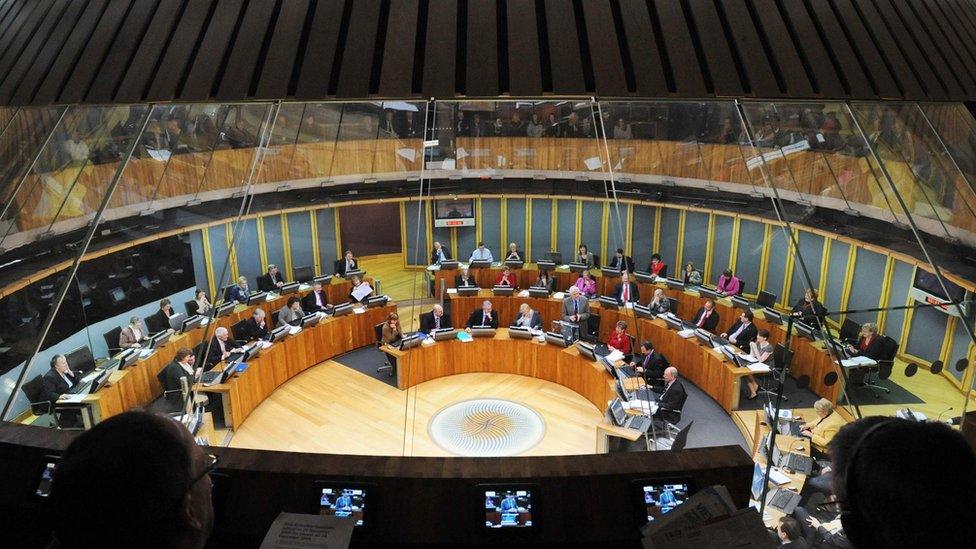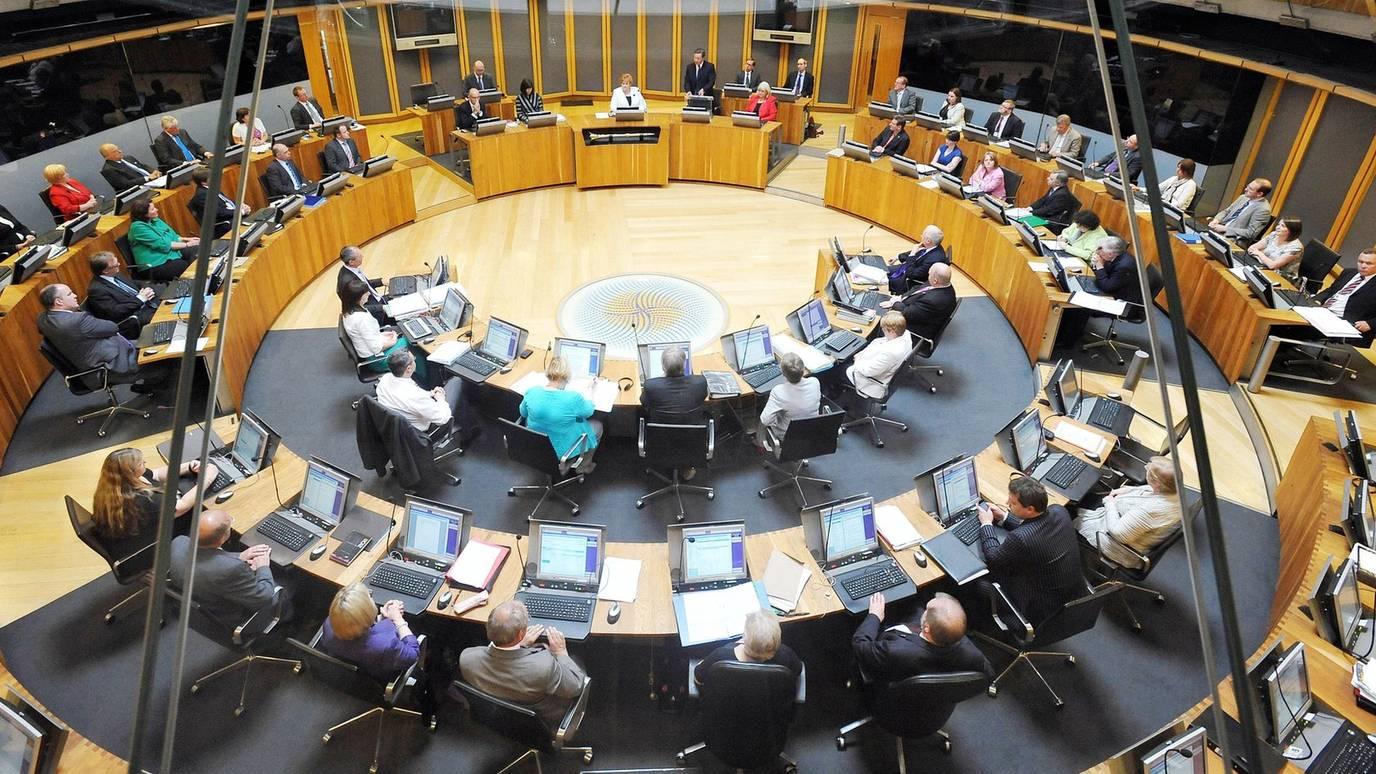Welsh Secretary 'optimistic' on revised Wales Bill deal
- Published
Welsh Secretary Alun Cairns says the Wales Bill, published on Tuesday, clarifies 'who is responsible for what'
Welsh Secretary Alun Cairns has said he is optimistic UK and Welsh ministers can reach agreement on the Wales Bill.
A revised version of the proposed law, that would change how the assembly makes laws and boosts its powers, was published on Tuesday.
Its earlier draft proved controversial amid claims it would hamper AMs' powers.
But First Minister Carwyn Jones said his remaining objections would not stop the bill.
Under the revised version, more powers, including coal licensing, would be devolved than previously planned.
Partial control over income tax would also be granted without a referendum.
The bill has now been presented to Parliament and is expected to complete its passage through the Houses of Parliament within the next 12 months.

Mr Cairns told BBC Wales the bill's "fundamentals are broadly agreed" with the Welsh Government.
"We want to negotiate on the fringes of elements of the bill but I'm optimistic that we can overcome those," he said.
Mr Cairns said the the UK and Welsh governments "both want the same thing, we want the Welsh Government to be accountable for the decisions it takes, but also for people to understand what is devolved and what is not devolved".
Asked if there would be any way the UK government could block the wishes of Welsh ministers on making legislation, he said: "Not at all."
"We're asking the assembly to rightly consider the implications of any law that it passes but every mature institution rightly does that."
Writing in the Western Mail, external, Mr Cairns said: "The UK government has listened, overhauled the draft bill in key areas and has produced a piece of clear legislation that takes account of the distinct and growing body of Welsh law."
Carwyn Jones says the assembly should be able to consent to the transfer of income tax, saying he is worried of a 'stitch-up' over the financial framework
Mr Jones previously warned the draft Wales Bill could amount to an English veto on Welsh law.
But on Tuesday Mr Jones said his remaining objections to the bill were not sufficient to stop it progressing.
"First of all it's not so badly flawed that it can't be improved, which the old bill was," he said.
"The old bill, basically, would have taken powers away from the people of Wales and given Westminster a veto in many, many areas.
"That's gone, I welcome that, but there are still some areas of detail that will need to be examined."
Mr Jones said there remained issues on which the Welsh and UK governments fundamentally disagreed.
"Why, for example, is the criminal law going to be mainly dealt with in Cardiff yet alcohol licensing will be in London?
"And policing will still be in London, whereas policing is devolved in Scotland, Northern Ireland and even Manchester."
Mr Jones also expressed concerns that the Welsh Government could be "stitched-up" over a financial deal to allow the devolution of income tax.

The Wales Bill promises new powers for the assembly - including over assembly elections, speed limits, and fracking - and rewrites how Wales is governed by defining what is under the control of Westminster, known as the reserved powers model.
The change is an effort to make Wales' devolution settlement clearer. The current system defines what is under the assembly's control, with everything else assumed to lie with the UK government.
But the draft version, published last year, faced considerable criticism across the political spectrum, with some saying the law would reduce the assembly's powers rather than increase them.
The row prompted the UK government to promise significant changes to the planned legislation, and the revised bill has several changes that include:
Scrapping proposed necessity tests for Welsh laws, which had sparked fears that the Welsh laws would end up in the courts. Instead there would be a system of "justice impact assessments" for how assembly bills affect the legal system.
Extra powers for AMs that were not included in the draft, including control over heritage railways, street trading and coal licensing
Powers to vary income tax without the need for a referendum
A reduction in the list of powers reserved to Westminster
There is no provision for a distinct legal jurisdiction despite claims the new system needs a clearer separation between English and Welsh law to work properly.
However, a working group of officials from the Wales Office, Ministry of Justice, Welsh Government, and Lord Chief Justice's office is to be set up to decide how the judicial assessments are dealt with.
That group will report back by autumn 2016 on the "constitutional and practical implications" of diverging Welsh laws within the England and Wales justice system.
Plaid Cymru Westminster group leader Hywel Williams said: "The UK government's words have once again been proven hollow.
"The new Wales Bill will entrench Wales' status as the poor relation in this union, limiting our democratically elected government from acting in the interests of the people it represents, keeping as much power as possible on the corridors of Whitehall while devolving just the bare minimum.

David Cornock: "Minister tries to end Welsh powers arguments (again)"

"The Wales Bill," says the secretary of state, "is in the finest traditions of Welsh radical reformers like Lloyd George. It is designed to set the course for decades ahead and put a definitive end to outdated arguments over who possesses what powers."
What could possibly go wrong?
You cannot fault Alun Cairns' optimism as he unveils the latest Wales Bill on Tuesday but you may feel we have been here before.
For more see David's blog.
- Published18 May 2016

- Published7 March 2016

- Published29 February 2016

- Published29 February 2016

- Published28 February 2016

- Published20 October 2015
